On July 6, 2024, the Basic Income Network commemorated its 20th anniversary at the Budde-Haus in Leipzig with a series of lectures, discussions and panels. The event, attended by approximately 60-70 participants per session, convened a diverse group of scientists, activists and interested citizens. It featured a range of presentations, conversations, networking opportunities and festivities. Dr. Verena Löffler, Franziska Leopold, and Tobias Dumschat, researchers from different FRIBIS teams, participated as panellists.
Basic Income and Care
Tobias Dumschat, Coordinator of the FRIBIS team “care”, and a doctoral student at FRIBIS, participated in the “Work – Care – Basic Income” discussion from 2:15 pm to 4:00 pm. He shared findings from his qualitative study, which investigates whether family caregivers need a basic income or not. His research focuses on non-retired caregivers who assist elderly dependents. Dumschat discussed ways in which a basic income might expand the range of actions available to this group and shared the subjective views of those affected.
Reflecting on his role as a speaker, he commented,
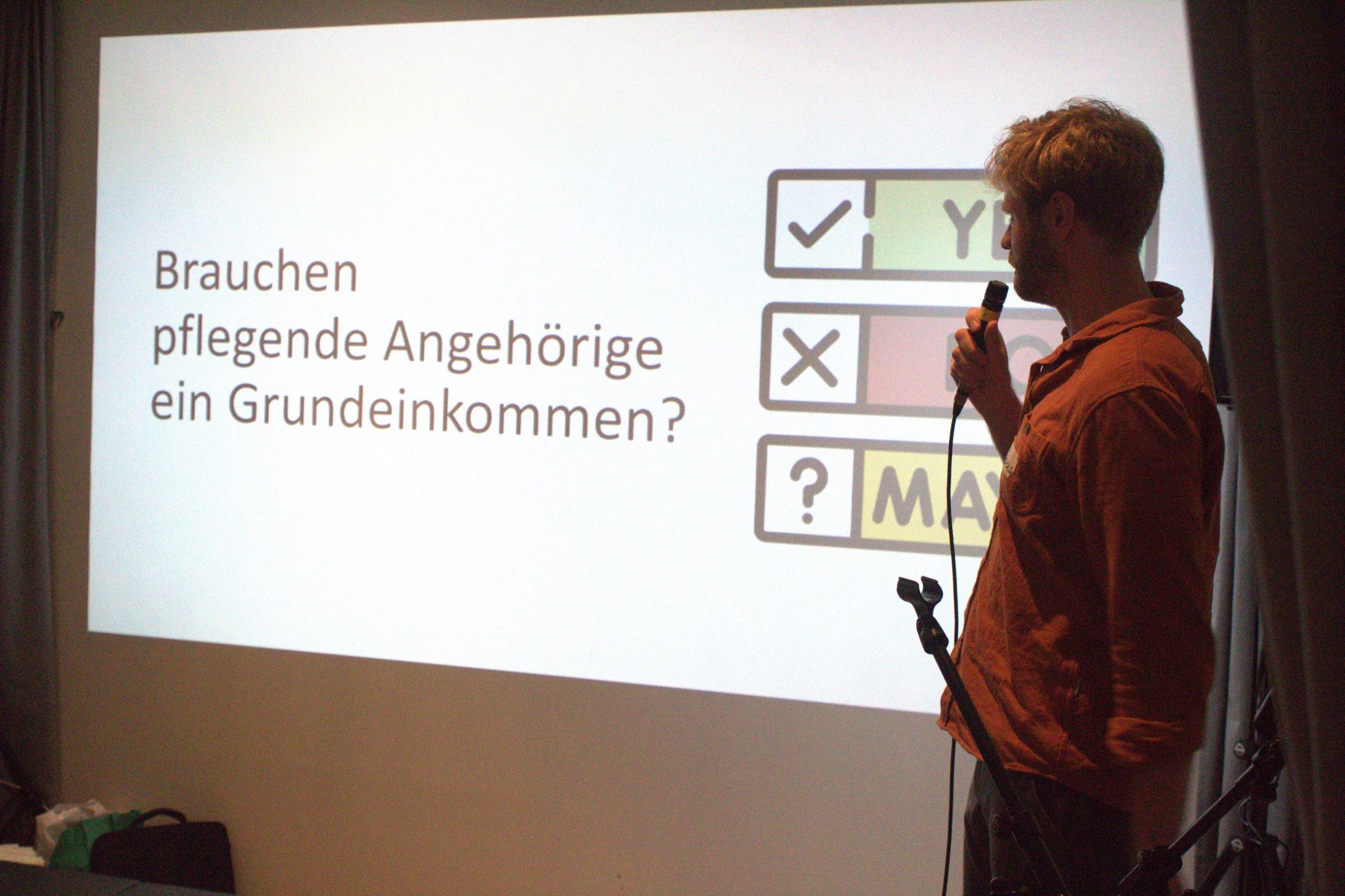
Tobias Dumschat
I was delighted to be able to present my unpublished research results at the 20th anniversary of the Basic Income Network. After many months of solitude, it was time to share the outcomes and engaging with such an attentive audience was particularly rewarding. The discussion with Margit Appel, Barbara Prainsack, and Elfriede Harth, along with the feedback from the audience, was very inspiring. Afterwards, we divided into smaller groups to allow for more detailed discussions based on the research findings. I gained many insights from this roundtable that I will incorporate into my ongoing research. Overall, it was an excellent day filled with engaging discussions.
Homelessness and Basic Income
From 4:15 PM to 5:15 PM, Dr. Verena Löffler, also a member of the FRIBIS team “care”, presented her findings on “Homelessness and Basic Income.” She explored whether a basic income could improve the living conditions of the most disadvantaged. She shared results from various projects, suggesting that an unconditional basic income could serve as a preventive measure against homelessness. Löffler described the subsequent discussion as “very productive”:
I was particularly pleased to see the conclusions I reached from theory confirmed by practitioners in homelessness assistance. Sandy Feldbacher from the street magazine KIPPE highlighted a crucial issue—the accessibility of the current social system for EU immigrants—and questioned whether this would change with a basic income. This, in my view, pinpointed a critical concern among some basic income proponents as the financial feasibility of a UBI by the DIW, for example, is based on the assumption that current restrictions will be maintained. At the event, some attendees confirmed that the basic income model they supported would include all residents of a specific area, regardless of their legal status. Another interesting discussion arose when the audience questioned why those who would be likely to benefit most from a basic income often oppose it. Chris, formerly homeless, mentioned that there was a certain distrust of the unconditional nature of the payment. The concept of receiving money without any conditions is difficult for many homeless people to grasp as they typically have to expose significant personal details to receive financial assistance.
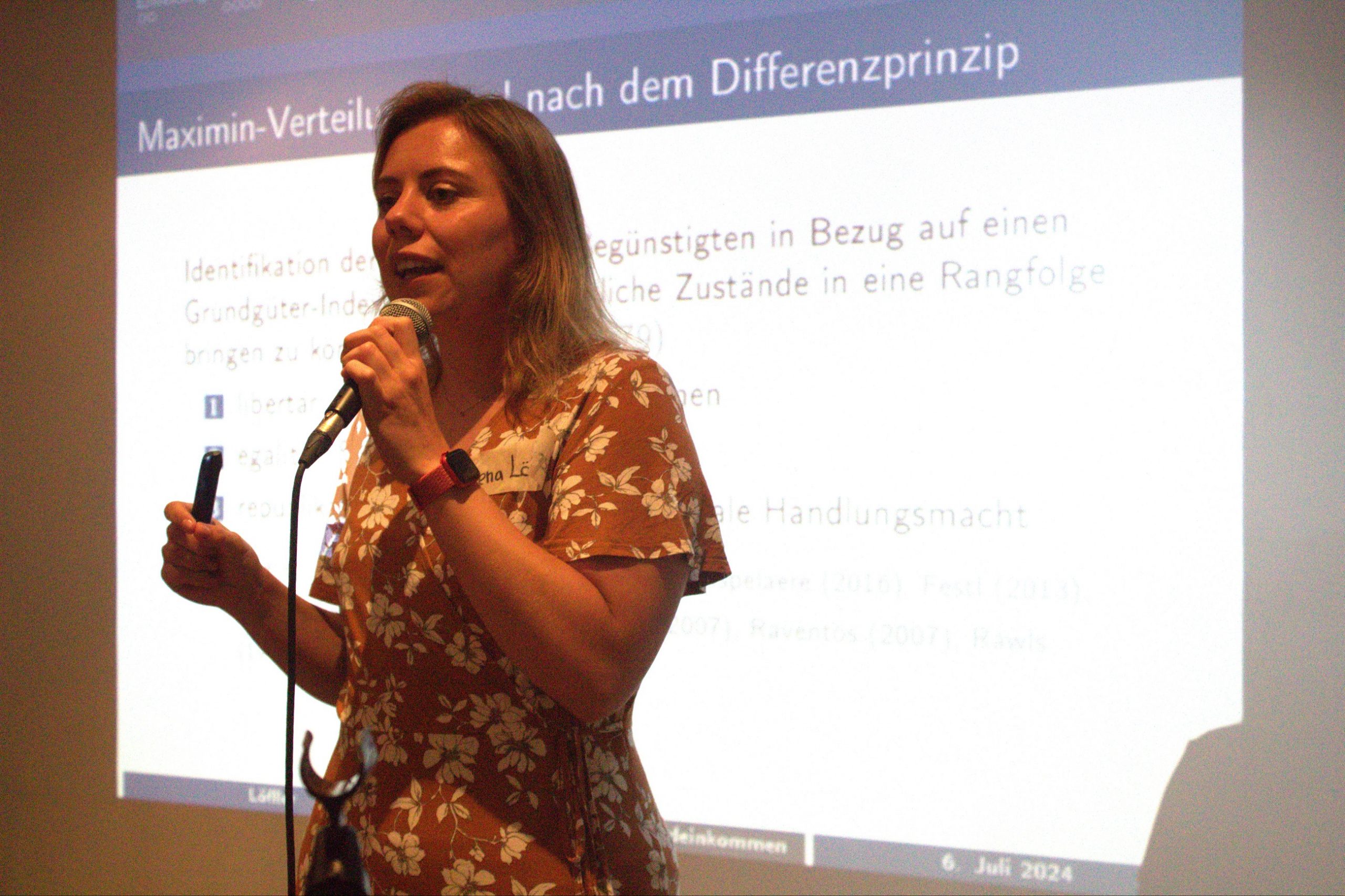
Dr. Verena Löffler
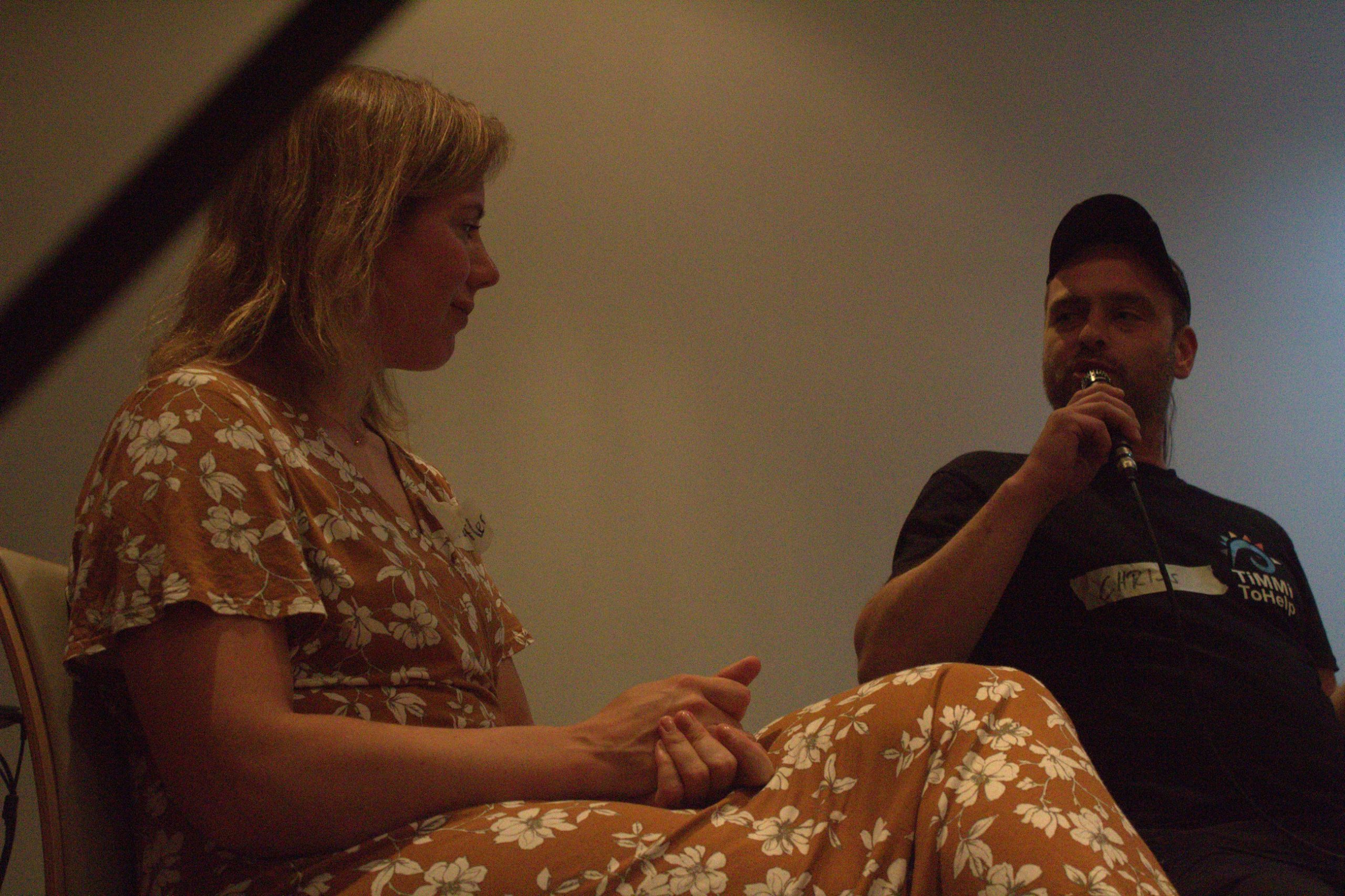
Verena Löffler im Gespräch mit Chriss (Wohnungslosenaktivist)
Public Opinion on Basic Income and NGO Strategies
Franziska Leopold, Coordinator of the FRIBIS team MUBINGO and a research associate at FRIBIS, presented her study, “Approval and Positions on Basic Income – Hints for Successful NGO Strategies” from 5:30 p.m. to 6:15 p.m. Her research not only addresses public opinion on basic income but also explores the challenges faced by volunteers within the German-speaking basic income movement. Leopold shared the outcomes of her analysis, which assessed public sentiment across various demographic groups and identified factors that influence support for basic income.
She reported that her presentation was well received, with some participants inquiring afterwards whether the information was already publicly available. The audience showed keen interest in how a basic income could be framed to enhance public acceptance. Her findings have reinforced NGO efforts by illustrating that knowledge about basic income in the general population is still rather limited.
What became apparent to me for the scientific discourse is the importance of preparing results in German concisely and making them available to NGOs to promote societal exchange. In my opinion, what particularly got the activists to think was that those who would benefit most from a basic income (people with low incomes) are the least active, as well as women, in line with with the activists’ experiences. Additionally, younger individuals tend to be less involved. I sensed that some activists were indeed receptive to my suggestions on how to possibly better engage these groups (offering more one-time, less formal and broad activities, perhaps through competitions/art, collaboration with the environmental scene, etc.).
The Basic Income Network’s Perspective on Collaboration between Activism and Academia
We spoke with Ronald Blaschke, co-founder and long-time member of the Basic Income Network, about his views on the role of collaboration between research and activism in advancing the basic income movement and the accomplishments of activist efforts over the past two decades. Blaschke, who has been active in such social movements for 30 years, including 20 in the basic income movement, has published on basic income, held teaching positions, and worked professionally in the German Bundestag and voluntarily with the Basic Income Network and scientific institutions.
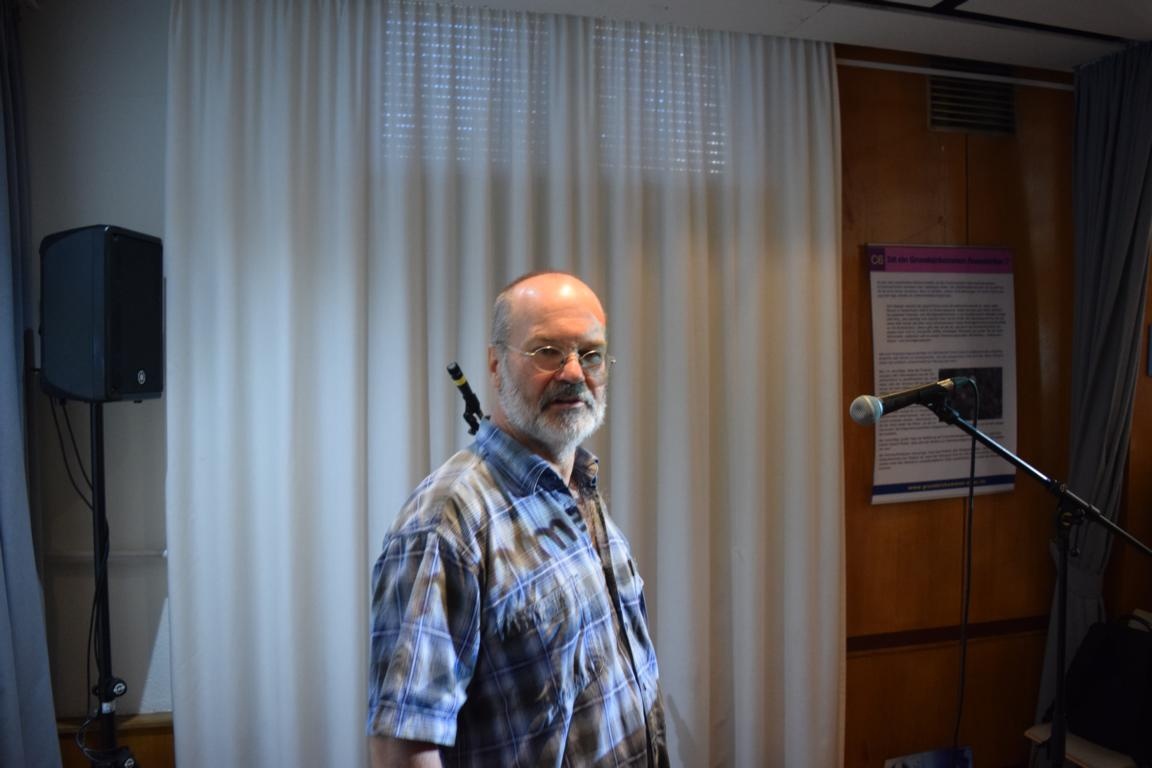
Ronald Blaschke
Research and social movements can cross-fertilize each other. Science can learn what the relevant topics, questions and answers are for social movements. Social movements can critically examine their own topics and answers, underpinning them scientifically. The dialogic exchange on basic income and related topics is important. It happens too infrequently and needs more support and continuity.
Lack of overview of previous Basic Income research?
However, he sees a problem in the perception of existing knowledge about basic income by researchers:
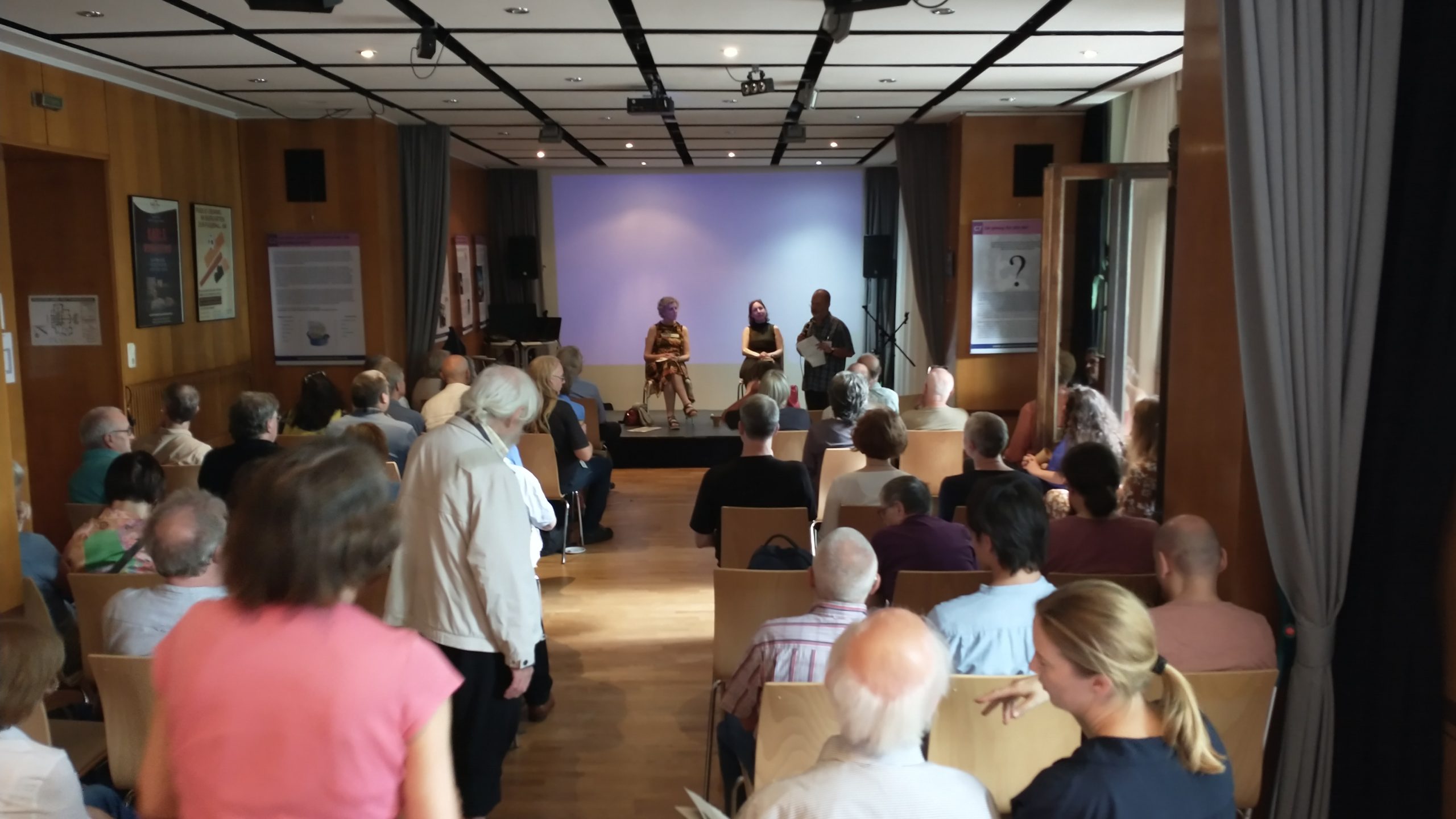
Margit Appel, Barbara Prainsack, Ronald Blaschke
Research and social movements can cross-fertilize each other. Science can learn what the relevant topics, questions and answers are for social movements. Social movements can critically examine their own topics and answers, underpinning them scientifically. The dialogic exchange on basic income and related topics is important. It happens too infrequently and needs more support and continuity.
Editorial Note: The Basic Income Network recently published a comprehensive literature list on the topic of basic income. This list includes over 1,300 titles of German-language works on basic income and thus represents the most comprehensive compilation in this field to date. The list is publicly accessible and is continuously updated by the Basic Income Network’s Literature Working Group.
Communication between Research and the Public
Blaschke also emphasized the need for improved communication between researchers and the general public:
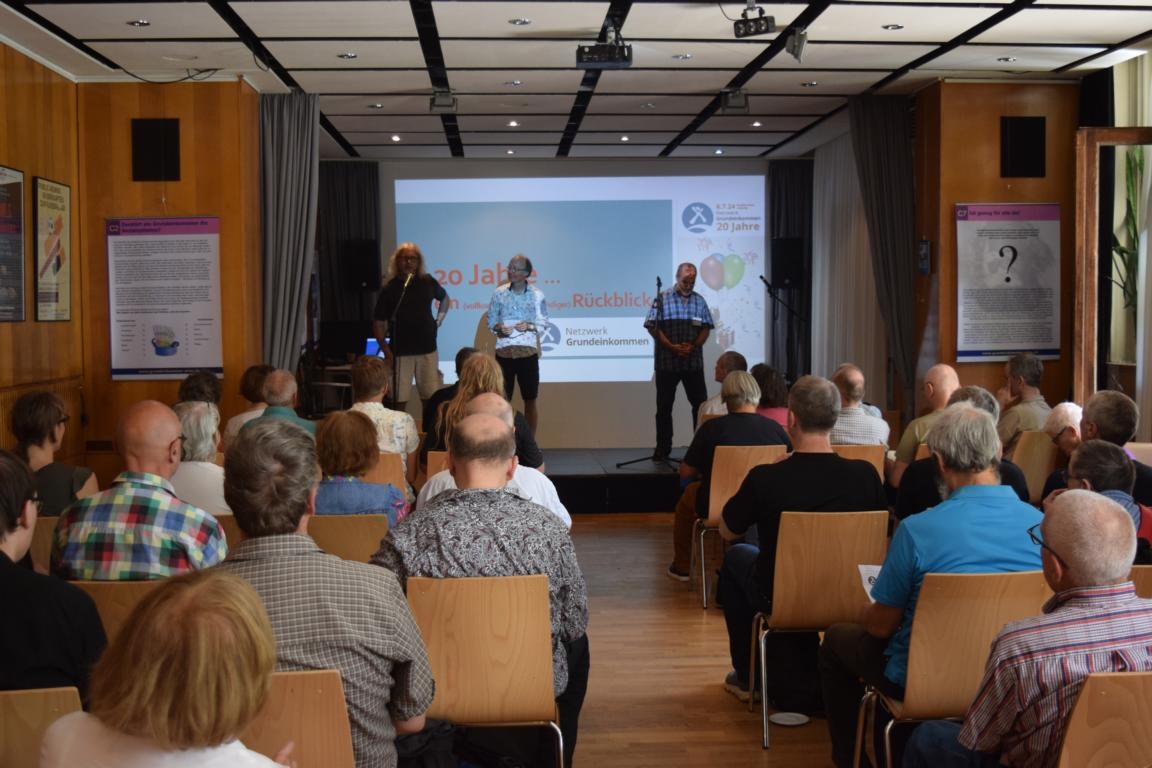
Opening of the celebration
If research wants to disseminate knowledge and engage in public discussions, it must be able to speak at least two ‘languages’: an academic language that is globally understandable — typically English — and a ‘day-to-day’ language that resonates with the everyday experiences of people, presented in their native language. This principle also applies to basic income research. Without this dual-language capability, much potential is lost. Luther’s translation of the Bible was revolutionary for making scripture accessible; similarly, we must strive to make scientific insights accessible.
Conclusion
In summary, the anniversary celebration powerfully reaffirmed the significance of ongoing dialogue between research and activism for the future development of the basic income concept. The event also underscored the importance of presenting research findings in a manner that is comprehensible to the broader public, thereby enhancing the civic dialogue on basic income.



